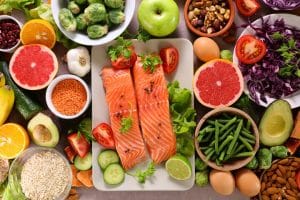A preconception diet high in fruits, vegetables, seafood, dairy, eggs, and whole grains may reduce the risk of miscarriage, according to a new research review. Tommy’s-funded researchers at the University of Birmingham analyzed 20 studies that examined the eating habits of women during the months leading up to and just after conception to see if they found any evidence of an association with lower or higher risk of miscarriage. In the journal “Fertility and Sterility”, the team at Tommy’s National Center for Miscarriage Research concludes that there is evidence that a diet rich in fruits, vegetables, seafood, dairy, eggs, and grains lowers the risk of miscarriage.
Diet and Risk of Miscarriage
These are foods typically found in a ‘healthy’, balanced diet, with previous evidence showing that a balanced diet rich in vitamins and minerals is important during pregnancy. The research study found that high fruit consumption, compared to low consumption, may be associated with a 61% reduction in the risk of miscarriage. High vegetable consumption may be associated with a 41% reduction in the risk of miscarriage. For dairy products, the reduction is 37%, for cereals 33%, for seafood and eggs 19%.
Led by Dr. Yealin Chung, researchers also examined whether predefined dietary patterns, such as the Mediterranean diet and other fertility diets, might also be associated with miscarriage risk. They found no evidence that adherence to any of these diets increased or decreased risk. However, a diet that includes overall healthy foods or those rich in antioxidants and low in pro-inflammatory foods or unhealthy food groups may be associated with a reduced risk of miscarriage for women. A diet high in processed foods was found to be associated with a doubling of the risk of miscarriage.
The studies included in the analysis focused on the period before conception – a period before and during the first three months of pregnancy. Data from a total of 63,838 healthy women of childbearing age were included, with information about their diet usually collected through food frequency questionnaires for each study. Miscarriages are common, with an estimated one in six pregnancies ending in miscarriage, and there are many known causes, from problems with the baby’s chromosomes to infections in the womb. However, almost 50% of early miscarriages remain unexplained.
Healthy Lifestyle Choices
There is a growing body of evidence that lifestyle changes – including dietary changes, avoiding nicotine and alcohol before conception and in the early stages of pregnancy – can have an impact. Researchers urge couples to consider the importance of positive lifestyle choices when planning a family and to maintain those healthy decisions throughout pregnancy and beyond. Knowing that positive lifestyle choices can significantly reduce the risk of miscarriage can empower couples to take responsibility for their health and their baby’s health.
The researchers explain that miscarriage is very rarely due to a person’s lifestyle choices. Eating a healthy diet, taking supplements such as vitamin D and folic acid, exercising and trying to reduce stress are all things that people can do, but there is no clear evidence to date on the link between dietary habits and miscarriage.
In the face of this lack of evidence, there are no evidence-based guidelines that include dietary recommendations for women and child-bearers or their partners – something that, according to the findings of the experts in this review, could have a real impact on helping people reduce their risk. Tommy’s team concludes that more studies are needed, particularly research that addresses whether any food group or dietary pattern and its association with miscarriage risk is causal, as well as research that can accurately estimate how effective a dietary change might be during the critical periods of conception and pregnancy.





